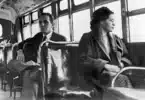Songs are powerful. There’s something about the marriage of lyrics and music that resonates with people. For as long as they’ve existed, songs have built community, told stories, and described emotions. Songs are also a tool for resistance and change, unifying and inspiring people dedicated to a cause. Here are ten historic resistance songs:
“We Shall Not Be Moved” (unknown)
Various artists
The origin of this song is not clear, though lyrics can be traced back to the book of Jeremiah. These lyrics changed over the years. By the 20th century, labor activists adopted it and it became a protest song instead of a religious hymn. Artists such as Pete Seeger recorded versions. The song then became iconic during the Civil Rights Movement.
“Strange Fruit” (1939)
Abel Meeropol
Abel Meeropol wrote the lyrics and music to this haunting song about lynchings. In the 1930s, this violence was common, but not talked about. Billie Holiday and Nina Simone recorded very famous versions. For many, “Strange Fruit’ is the first significant Civil Rights song.
“This Land is Your Land” (1944)
Woody Guthrie
Folk artist Woody Guthrie wrote this song as an alternative to “God Bless America.” It emphasizes equality. Before writing the song, Guthrie spent years traveling the United States, meeting people affected by the Great Depression and Dust Bowl. He believed Irving Berlin’s “God Bless America’ was out of touch. “This Land is Your Land” contains patriotic sentiments, but it acknowledges tough reality.
“A Change Is Gonna Come” (1964)
Sam Cooke
One of the most iconic songs of the Civil Rights movement, “A Change is Gonna Come” was added to the Library of Congress in 2007. The lyrics are sad, but hopeful, reflecting the struggle of black Americans. Cooke wrote the song following an event where a whites-only motel in Louisiana denied him entry. Various publications have included “A Change” on their lists of the greatest songs ever written.
“We Shall Overcome” (1963)
Pete Seeger
Based on a union song, “We Shall Overcome” entered the mainstream when Pete Seeger recorded it. In the 1960s, it became tied to the Civil Rights Movement. At the March on Washington in 1963, Joan Baez sang the song with 300,000 people. It was also sung at Dr. King’s funeral. Because it’s so powerful and well-known, it continues to appear at various protests.
“The Revolution Will Not Be Televised” (1970)
Gil Scott-Heron
The title from this song was originally a Black Power slogan from the 1960s. It refers to how the white-controlled media does not reflect the times or changes that America will go through. The song is full of pop culture references. It’s been sampled and referenced in many hip-hop songs.
“Fortunate Son” (1969)
John Fogerty
A song protesting Vietnam, the “fortunate son” of the title refers to wealthy, privileged men who were able to dodge the draft. It’s continued to stand strong as an anti-war song and a symbol of counter-cultural movements. John Fogerty, the lead singer of Creedence Clearwater Revival, was very angry when he wrote the song. He’s said it only took him about 20 minutes to write it. In 2013, “Fortunate Son” was added to the National Recording Registry.
“F*** Tha Police (1988)
N.W.A.
Originally released in response to police brutality in the 1980s, this song has endured in popularity. In the wake of the high-profile deaths of Michael Brown and Eric Garner, streams of this N.W.A. song skyrocketed in 2014 and 2015. The song became popular again in 2020 following the death of George Floyd and nationwide protests. People write the lyrics on buildings and homemade signs.
“Killing in the Name” (1992)
Rage Against the Machine
This lead single from Rage Against the Machine’s first album came in hot. It’s impossible to ignore the sheer power of the music and uncompromising lyrics about police brutality and institutional racism. It isn’t shy about its stance, directly linking the police with the KKK with the lyric, “Some of those that work forces as the same that burn crosses.” In 2010, the New Statesman listed it as #12 on their list of “Top 20 Political Songs.”
“Do You Hear the People Sing?” (1980)
Claude-Michel Schonberg, Alain Boubil, and Jean-Marc Natel
Featured in the global smash hit musical Les Miserables, this song has a second life as a resistance song. Even though the story of Les Mis is set in a specific time in France, its message resonates around the world. The musical has been translated into 21 different languages. In 2019, large crowds protesting in Hong Kong sang it. At a school assembly, students began to sing it in place of the Chinese national anthem. “Do You Hear the People Sing?” has appeared at other protests, like in Turkey in 2013 and Ukraine in 2014.
Learn more about revolutions, uprisings and protest in an online course.












